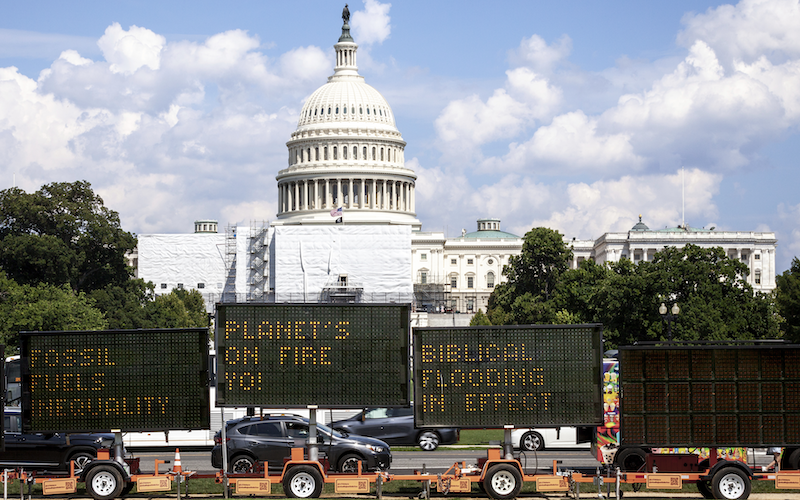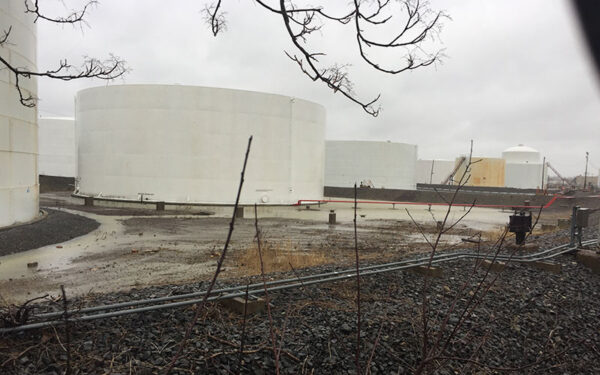
This new climate law will support the momentum of New England's climate action. Photo: AP.
I’ve worked to fight climate change for 15 years, most of that at CLF. In that time, we’ve pushed nearly every New England state to pass climate laws that mandate cuts to polluting emissions. We’ve shut down dirty coal in the region. And we’ve taken on Big Oil for sacrificing our health and safety for the sake of their profits. But even as we take such great strides here at home, the U.S. Congress has made little to no progress on meaningful climate legislation.
That is, until this month.
After a 12-hour marathon of heated debate and rapid-fire amendments, the Senate passed a first-of-its-kind climate bill: the Inflation Reduction Act of 2022. Then, the House passed the bill – and finally President Biden signed it into law on August 16, 2022. This law is far from perfect, but it’s important and overdue. It also reemphasizes that state and local action remain imperative across the country.
What the Inflation Reduction Act Does
Through various funding, tax credits, and rebate programs, the Inflation Reduction Act has the potential to slash climate-damaging emissions by 40% by 2030. To do that, the law directs resources towards deploying clean energy technology like solar panels, offshore wind infrastructure, and electric vehicles. It also promises to make the transition to clean energy, heating, and transportation more affordable and accessible. And, critically, it funds climate justice: ensuring that those communities hit first and hardest by climate change – the same communities that historically shoulder climate impacts and are left behind by our solutions – receive critically needed support.
The Act moves the needle on cleaning up power sources in several respects. Perhaps most significantly, it extends tax credits for clean energy projects like solar, wind, and battery storage (and extends those credits to new and existing nuclear) for ten years. It also creates a federal “green bank” program that will provide loans and other financing for home and business clean energy projects.
The law also invests in domestic manufacturing of clean energy technologies that will drive economic development and new job creation. And it ensures a larger supply of electric vehicles, heat pumps, and battery storage as electricity demand expands.
We can’t forget about methane, a polluting emission from gas and one of the biggest contributors to climate change. It is more than 80 times more potent than carbon dioxide. To help reduce its impact, the Inflation Reduction Act creates a system that imposes fees on methane emissions from wellheads, pipelines, and other gas infrastructure. These fees increase over time to force gas companies and utilities to address leaks. This system can also provide an incentive to transition to clean electricity.
Where the Inflation Reduction Act Falls Short
The law has several gaps, however. To move it through what seems to be an eternally stymied U.S. Congress, Senate Democrats made several trade-offs with the law’s key provisions.
The first and most glaring gap is that this law alone will not be nearly enough to meet our country’s science-based commitments under the Paris Agreement: limiting global warming to 1.5 degrees Celsius (or 2.7 degrees Fahrenheit).
The second glaring gap is the law’s unfortunate fossil fuel compromises. The Inflation Reduction Act opens federal waters in the Gulf of Mexico and Alaska’s Cook Inlet to more oil and gas leasing. It also requires new federal land leases for oil and gas exploration in exchange for any new leases for wind and solar projects. And it provides more tax credits for carbon capture and sequestration projects (storing carbon pollution rather than letting it blanket the earth). This is despite a history of fossil fuel industry abuse in already claiming nearly a billion dollars in previous tax credits for non-qualifying projects.
What Does the Inflation Reduction Act Mean for New England?
This law should make it easier and more affordable for you to buy, lease, and rent a new or used electric car. Not to mention better access to charging stations for that car. It should also make it easier to heat and cool your home with an electric heat pump and replace your old appliances with energy efficient ones that cut your overall energy bills. And you are more likely to see electric school buses, transit buses, heavy duty trucks, and commercial vehicles in your community – meaning healthier air for everyone.
On a broader scale, the Inflation Reduction Act effectively establishes a federal program with an emissions target similar to the mandates already passed here in New England. Five out of six New England states have climate laws on the books. Most of those laws require cutting carbon pollution by 45% by 2030 (and to net zero by 2050). I cannot overstate the potential of this new alignment between our states’ climate mandates and that of our federal government.
The infusion of federal funding provided by the Act will deliver a much-needed boost to our states’ climate plans. Such financial support leaves no room for half measures and better ensures our states are all in when it comes to transformative climate policies.
Our regional strategy to use electricity instead of dirty fossil fuels to power our transportation, heating, and industrial processes only works if we clean up our power sources. As noted above, the Inflation Reduction Act creates incentives for solar, wind, and battery storage, driving investment in those power sources here at home. Also, by expanding markets for clean energy technologies like electric vehicles and heat pumps nationally, the Act will help make them more accessible, speed their innovation, and drive down their cost at the state level.
State Climate Action Is Far from Over
While the passage of this law is historic and should be celebrated, it does not mean that we can step back the urgency of state level efforts to cut carbon pollution – in fact, it means just the opposite.
Each of our New England states must expand its efforts to slash polluting emissions while fully taking advantage of the Inflation Reduction Act’s support. Both the immediacy of the climate crisis and the mandate created by each state’s climate law dictate such urgent action.
After 15 years of fighting the climate crisis, I know that there’s no telling when and if the federal government will again commit to such sweeping climate action.
So we must keep fighting here at home – to make sure fossil fuels have no future in New England. To hold Big Oil and Gas accountable for lying about climate change to sustain record windfall profits. To make our transition to a clean energy future accessible, affordable, and achievable for all New England residents.
Stay tuned for updates on the law, our regional climate action, and how you can get involved.



